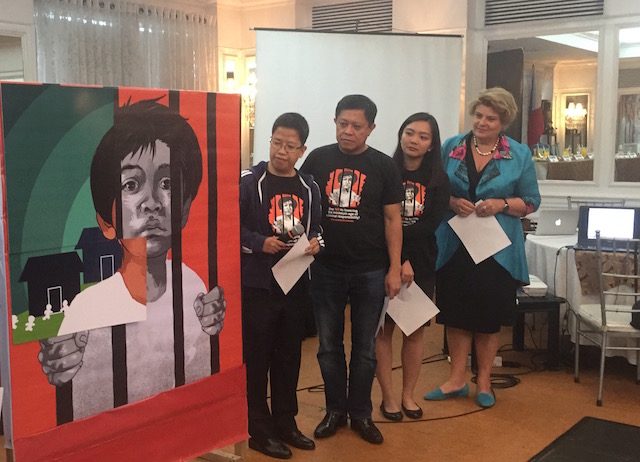SUMMARY
This is AI generated summarization, which may have errors. For context, always refer to the full article.

MANILA, Philippines – A House lawmaker opposing the bill that lowers the age of criminal responsibility to 9 years old likened the House leadership’s approach on the issue to Kellyanne Conway, counselor to United States President Donald Trump.
“This will boomerang sa kanila (on them). For sure even in the committee hearings, even in the floor debates, many of the House leadership are doing the Kellyanne Conway approach: non-responsive, absurd, walang (no) data, not resorting to hard evidence, ‘yan ang status ngayon (that’s the status right now),” Akbayan Representative Tom Villarin said on Thursday, February 16.
Villarin joined Senator Risa Hontiveros, UNICEF Philippines Country Representative Lotta Sylwander, and other advocates on Thursday in opposing House Bill 2 or the Minimum Age of Criminal Responsibility Act.
Villarin said these are “dangerous times” for the House of Representatives, as lawmakers, according to him, want to shorten the arguments on the proposed bill.
Stories on juvenile delinquency:
“In fact, next week, Speaker Alvarez wants to have already a final committee report for the lowering of age of criminal responsibility. Meaning, his House Bill 2 will be reported out as a committee report, and committee reports, for example in the House, it’s a one-pager. It doesn’t explain why the proposed measure is like this… In other words, no arguments to guide legislators for their informed decision,” he explained in a mix of English and Filipino.
As a compromise, congressmen are proposing to lower the age to just 12 years old instead of 9 years old, but Villarin said Alvarez rejected this.
“It only shows how the House leadership thinks. Either that they have undeveloped brains, or when they don’t have good arguments anymore, they resort to threat, intimidation, and bullying. And many House members are resenting that attitude of the leadership,” he added.
Still, the lawmaker is certain that people will go against such “regressive measures” in Congress. (READ: Passage of death penalty, criminal liability age bills eyed in June)
Fighting chance at the Senate
For Hontiveros, the “intimidation” against House members is a reflection that the bill is not a positive proposal.
“If it’s a positive proposal that will give a second chance to children, if it will live to the principle of restorative justice that should be present in the criminal justice system, and if it’s really for the best interest of the child, you don’t have to force your colleagues [to support it], but they will be inspired to fight for it,” she said in a mix of English and Filipino.
In contrast, Hontiveros noted that groups opposing the bill are “inspired to resist and defeat” it.
“We have strong arguments, we have actual best practices, models being done in barangays (villages), we have legislative initiatives being done in the national level – those that will really give a positive alternative for children in conflict with the law and children at risk,” she added.
Hontiveros said they have a fighting chance against lowering the age of criminal responsibility at the Senate. Citing the mapping of advocates at the start of the 17th Congress, she said 10 senators including herself are against this proposal.
House Bill 2 seeks to amend Republic Act Number 9344 or the Juvenile Justice and Welfare Act of 2006, which sets the minimum age of criminal responsibility at 15 years old.
On Thursday, advocates opposing the bill cited the United Nations’ (UN) General Comment 10 on children’s rights in juvenile justice, which stated that a minimum age of criminal responsibility below the age of 12 is not internationally acceptable, while the age 14 or 16 is a “commendable high level.”
The Philippines ratified the UN Convention on the Rights of the Child in 1990. – Rappler.com
Add a comment
How does this make you feel?
There are no comments yet. Add your comment to start the conversation.